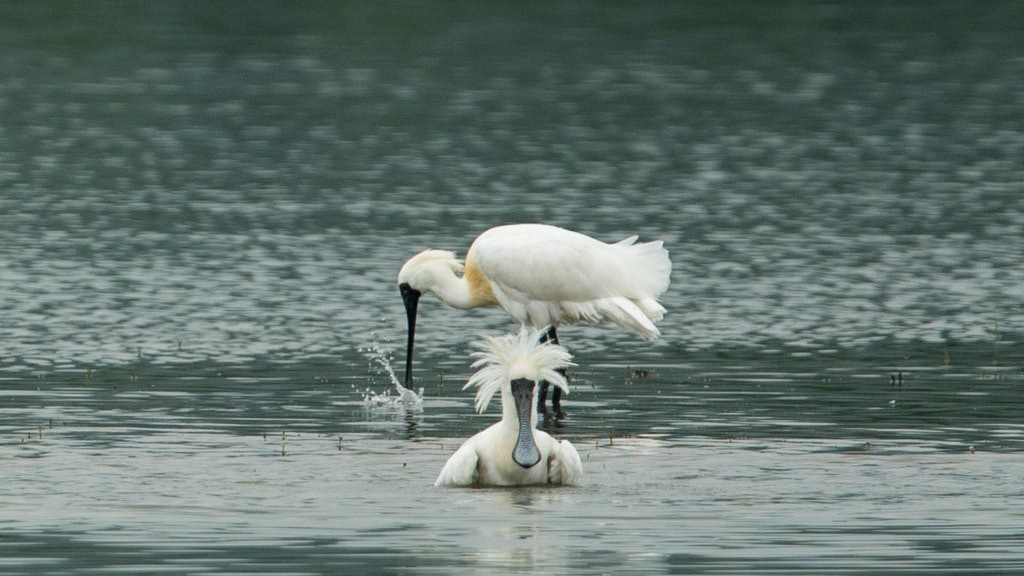Social News
Author: Lao Minyi
2020-04-08 14:36
Date of last update: 2020-04-08 14:36Black-faced Spoonbills, who come to Hong Kong for winter every year, broke the 4,000 mark for the first time last year. The Hong Kong Bird Watching Society announced today (8th) the results of the "Black-faced Spoonbill Global Simultaneous Census". The number of black-faced spoonbills is the highest since record, reaching 4,851, an increase of 8.7% compared with last year. Spoonbill rating, black-faced spoonbill may have the opportunity to "fall off."
However, the number of black-faced spoonbills perching in Hong Kong has declined significantly, with only 361 recorded in Deep Bay, a 22% decrease from 2010. The Bird Watching Index indicates that the quality of the Deep Bay wetland habitat is deteriorating.
Black-faced Spoonbill perched on Mai Po. (Li King Wa / Hong Kong Bird Watching Club)
+2
The Black-faced Spoonbill Global Synchronous Census covers more than 120 locations around the world. A total of 4,851 were recorded from January 17th to 19th this year, the highest since records were made in 1989, of which Taiwan was the largest with 2,785 (57.4% of the total) It also increased by 15.7% compared with last year. Most of them inhabit fish ponds in Tainan, which is estimated to be related to abundant food; followed by China (21.3%) and Japan (11.2%). As for Deep Bay (including Hong Kong and Shenzhen), it ranked fourth, recording 361 (accounting for 7.4%), a decrease of 22 from last year, and a decrease of 22% from 462 recorded in 2010, a decrease of 1.4% year-on-year.
The black-faced spoonbill may be rated next year as soon as possible
Yu Ridong, research manager of the Hong Kong Bird Watching Association, said that the record height of the black-faced spoonbill is a good news for the fourth time in the past five years, but the number of black-faced spoonbills has risen steadily. The Alliance's Red List of Endangered Species has been reduced from "endangered" to "vulnerable". He explained that each bird is evaluated once every 3 to 4 years. It is estimated that the black-faced spoonbill will be re-rated next year, and the chance of "endangered" is also greater. .
Black-faced Spoonbill foraging in a fish pond. (Chung Yun Tak / Hong Kong Bird Watching Club)
Huan Tuan Worries about the Deterioration of Deep Bay Wetland Environment
Yu Ridong also said that the number of black-faced spoonbills recorded in Deep Bay was more volatile, and the decline in environmental quality was worrying, indicating that the wetland environment was deteriorating. It is estimated that the food suitable for black-faced spoonbills was reduced, prompting them to choose not to come to Hong Kong for habitat. According to his analysis, it can be seen from the satellite map that the green range can still be maintained, but the development pressure and speed of Shenzhen are faster than that of Hong Kong. If the two places lack conservation and development planning and communication, and do not control the development of neighboring areas, it will cause certain pressure on the environment. Yu Ridong said, "Black-faced Spoonbills will go to the second degree if they live well," emphasizing that in addition to maintaining the safety of the winter land, the ability to forage is also an important consideration.
In addition, the number of black-faced spoonbills in Macao close to Hong Kong has also declined. Yu Ridong estimates that there may be an opportunity for the increase in reclamation and infrastructure projects in Macau in recent years. He said that if urban development in the Greater Bay Area continues and the coastal environment changes from mudflat wetlands to cities, the mudflat habitat suitable for black-faced spoonbills will be further reduced, and black-faced spoonbills may disappear in Deep Bay and Macau. The work on mudflats and fish ponds is urgent.
The Hong Kong Bird Watching Association stated that, in addition to the 7-year Hong Kong Fish Pond Eco-Conservation Plan, which has been implemented in fish ponds, it is recommended to add active conservation measures to maintain the integrity of fish ponds in the Deep Bay area, especially to maintain traditional aquaculture operations. For example, the government should exercise caution Approve the development plan of the fish pond area, strengthen the law enforcement work against the dumping of mud heads, and effectively increase the carrying capacity of the black-faced spoonbill in Deep Bay in the long run.
Number of black-faced spoonbills in the world and Deep Bay in the past five years
| 2016 | 2017 | 2018 | 2019 | 2020 | |
| global | 3356 | 3941 | 3941 | 4463 | 4851 |
| Deep Bay | 371 | 375 | 350 | 383 | 361 |
Source: Hong Kong Bird Watching Club
The number of black-faced spoonbills rebounds
The world's first black-faced spoonbill recorded more than 4,000, an increase of 13% from last year
[Heipi Conservation. Above] 30-year conservation road from 300 to 4000 black-faced spoonbills
[Heipi Conservation. Bottom] The number of black-faced spoonbills is increasing year by year but no longer coming to Hong Kong for winter?
Hong Kong Bird Watching Club Black-faced Spoonbill









